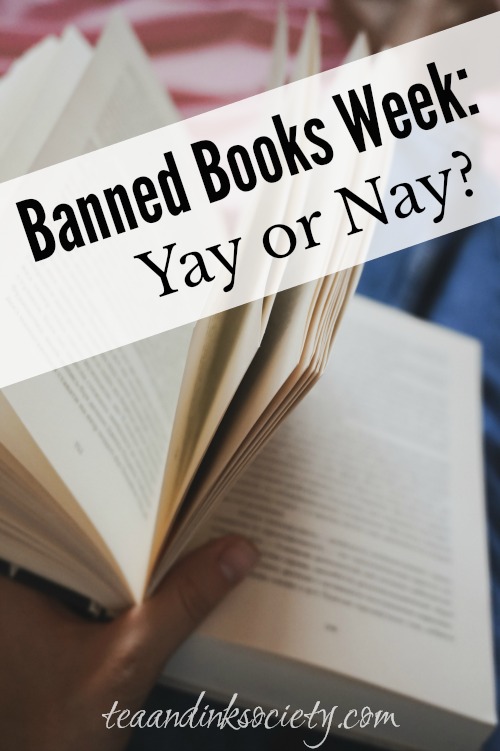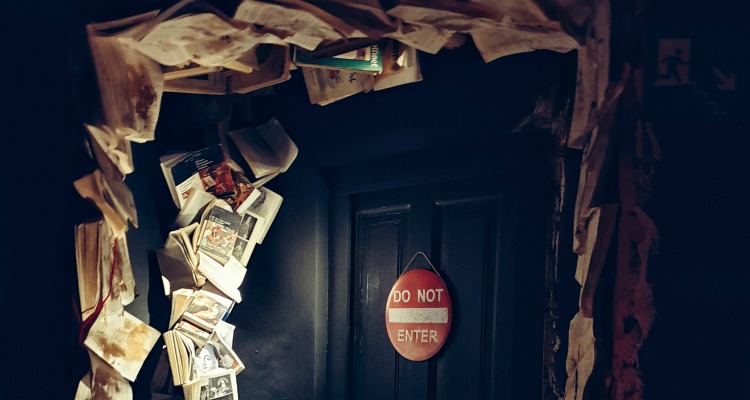Banned Books Week: Yay or Nay?
Banned Books Week gets national recognition each year. But is book censorship really a national issue? Here’s one book blogger’s take on Banned Books Week and the hype surrounding it.

Banned Books Week: It’s Not What You Think
The last week of September usually marks the annual Banned Books Week, founded in 1982 and promoted by the American Library Association. The goal of Banned Books Week is to draw attention to censorship and to celebrate the freedom to read. Sounds like a worthy cause…right?
It seems like every bookseller and booklover sings (or tweets) the praises of Banned Books Week, but I’m going to be the one stodgy bookworm dissenting from my armchair. My opinion: I think Banned Books Week is a little silly. A bit over-hyped. And maybe does more harm than good.
You’ve probably seen the Banned Books reading challenges that populate Pinterest and Google during the last week of September (and re-appear throughout the year). You’ve seen the checklists asking “How many banned books have YOU read?” Or perhaps you’ve seen promotional bulletin boards at your local library, decorated with jail bars or flames cut from construction paper.
It’s very sensational. Just listing a book as “banned” feels like an irresistible challenge to go get your hands on a copy and read it ASAP. Being subversive is fun. And by reading this banned book, you are bravely fighting ignorance, right?
When you take a closer look at typical banned books lists, it seems like an odd mix. The spectrum includes Charlotte’s Web on one end, and Lolita on the other. Where’s the rhyme or reason? Basically, a book might be “banned” for any reason, spanning from someone having an issue with talking animals (Charlotte’s Web), to themes of domestic abuse, racism, or gender politics. Quite the mix!
Looking at how eclectic these lists are, it seems a little foolish to read a book “just because” it was banned by somebody, somewhere.
Books are occasionally banned by specific schools, curricula, or libraries. More often, books aren’t actually banned, simply challenged by a concerned parent or patron. The thing is, people don’t challenge or ban books because they hate reading or are anti-literacy and anti-freedom. People challenge a book for a specific reason (although not everyone will agree that it’s a good one).
After I realised this, it seemed even more silly to get swept up in lionizing Banned Books Week. Why should we pedestal a book because some elementary school library pulled it from their shelves due to explicit content?
Crusaders for Banned Books Week may feel like they’re fighting a war on ignorance, but it seems to me like they’re just picking a fight. What most people overlook is that books aren’t actually banned or censored by the United States government at all. Instead, Banned Books Week is essentially speaking out over individuals who are exercising their constitutional rights to dissent.
Words really do have power. They can inspire–or haunt–you for decades after you’ve read them. Just because they’re printed in a book doesn’t make them inherently “good” in some way. And it certainly doesn’t make them appropriate for every reader.

In my personal reading life, I strive to be an intentional reader. I welcome books that make me think or that give me fresh perspectives, but I’m not going to read a book simply because it’s billed as controversial. If I start a book that I find distasteful, I don’t feel compelled to finish it. (Incidentally, here’s one way I vet books before I begin.) And if I come across a book that I don’t think is appropriate for its context–say, in my kids’ school library–I’m never going to be afraid to voice my concerns.
What are your thoughts on Banned Books Week? Do you think it’s needed? Do you think schools and libraries should be allowed to ban certain books from their shelves?
More Bookish Opinion Pieces at Tea and Ink:
What I Love and Hate About the Mystery Genre
Reclaiming the Reading Hour: Please Quit Netflix and Go Read a Book

Interesting viewpoint. I see no harm in ginning up interest in reading, even if it is subvert those who are “banning” books.
True, the catchiness might get non readers interested in picking up a banned book.
I don’t live in the United States so I’m not familiar with the Banned Books Week or its purpose. But I do have a few of the “banned books” on my TBR list; the ones whose subject interests me. I want to judge for myself if it contains anything that warrants banning.
Agree! I read what interests me, and decide if it meets my criteria for a permanent spot on my shelf or not.
I 100% agree with you. Besides, it’s the same list of books every single year. Who cares if they’re been banned? Just read what you freaking WANT to read.
Lol, yes. It just seems to me like one of the worst ways to get a book recommendation. It’s so random.
I guess I’m somewhat of a hypocrite because I agree with everything Elsie wrote in her blog; however, I teach high school English and always make a big deal about Banned Book Week – anything to get teenagers interested in reading.
Traci, I can see how getting teenagers to read would be a worthwhile way to leverage Banned Books Week! It would open up some interesting discussions, too.
Someone else said it! My co-blogger and I have been talking for ages about how Banned Books week isn’t that interesting or edgy because, well, the books aren’t really banned. Sure, taking a book off a single school reading list or removing it from a school or possibly even public library is a form of censorship–but the reality is that people are largely still going to have easy access to the book. If it’s not on your school list, you can read it on your own. If it’s not in your library, you can ask them to get it or probably just buy a copy. And no one is really edgy or brave or facing a band of haters for reading a book like Charlotte’s Web or Harry Potter or even, yes, Lolita. Like 95% of the population does not care if you read the book and does not actually think it’s controversial.
The real banning of books is the movement on Twitter and other platforms to have books that have been acquired by publishers pulled from publication. Or the case where Scholastic actually recalled all copies of a picture book that HAD been published because people deemed it offensive. Removing a book from the entire country because it’s offensive and declaring that no one can read it is actually censorship/banning, but no one talks about these cases because they either agree with them (It’s not censorship if the book DESERVES to be banned!) or because they’re too afraid that saying the book should be published or on shelves will get them labelled a bigot themselves. But the fact of the matter is that you don’t have to agree with a book’s message to think it shouldn’t be pulled from publication.
I agree! A publisher should think through these issues BEFORE offering the author a contract, not go back on their word after the book has already gone to press.
This was a thought-provoking article!
Exactly, you can get access to just about anything. Even if you don’t have a budget to buy books, inter-library loan will get you what you want.
But I did not know about people lobbying to have books recalled by the publisher! That is a different story altogether, and one that should get more attention. Goodness.
I’m late to the discussion, but I stumbled upon your lovely blog. I think Banned Book Week gets people energized to read more, but it may be overrated. My motto however is ‘if a book is worth banning then it’s a book worth reading’. Most of these ‘banned’ books I’ve discovered are insightful and often highlight a demographic or subject that often isn’t prominent in books.
School libraries may be the only opportunity for children and teens to access materials, so I’m against any censorship. If it bothers you then your child doesn’t have to read it. I also feel people challenge books before they’ve read it themselves. For example, the lead character may be lgbt and the public assumes it must be inappropriate.
The important thing is that the week gets people thinking and talking about literature. Whether it’s controversial and inappropriate depends on the reader.
Hello, welcome! That’s a good summary of the pros of Banned Books Week. I still think context matters and there’s a lot of that missing when people promote the event! I suppose it’s a good opportunity to be grateful for our First Amendment freedoms all around!
When the library commission decides what is allowed on shelves and hires and fires librarian based on their personal political leanings we must take notice and resist every way we can if you are lucky enough not to have experienced that then I suppose you are entitled to the luxury of your opinion.
Oh no! That sounds like perhaps a different kind of censorship or cancelling than the Banned Books Week I’m talking about here, but I can imagine that would be upsetting!
I guess my local library is not into banned books because I’ve never seen any displays in September encouraging readers to pick out from a selection of books they have on the shelves that’s specifically dedicated to ‘banned’. So I’ve never even heard of banned book week! After googling a few lists, it seems like those books have been off my radar anyway. I do remember picking up Perks of Being A Wallflower and not being able to get through the first chapter though! I also took it back to the library before my daughter had a chance to read it. I’m against censorship but in general I agree with other readers, as long as those books aren’t actually ‘banned’ and the list encourages people to read more, I’m for it! I’m excited to try your vetting method for finding new stories.